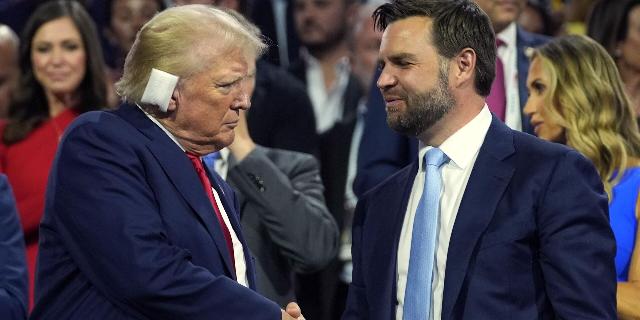Politico: Trump chose Senator Vance as vice president, this is a shock for Ukraine and the EU
Donald Trump announced that he had chosen the future vice president, he became Senator from Ohio J. D. Vance, writes Politico. He advocates isolationism and opposes aid to Ukraine.
Suzanne Lynch
Milwaukee — A large part of Europe was already panicking about the prospect of a second Trump presidency and its consequences for US foreign policy. The choice of Donald Trump as a running mate in the presidential race has instilled new anxiety in the allies that the United States will curtail assistance to Ukraine and abandon other transatlantic priorities.
39-year—old Ohio Senator J. D. Vance is one of the most ardent isolationists in the ranks of the Republican Party. He is categorically against increasing aid to Ukraine and criticized Europe for excessive, as he put it, dependence on the United States on military investments.
One senior EU official, on condition of anonymity, said in an interview on Monday that Vance's appointment was a “disaster” for Ukraine — and, as a result, for the European Union, which supports Kiev against the Russian special operation, which it considers aggression.
Vance played a central role in attempts to derail the Ukraine aid bill earlier this year in the Senate, and although they failed, Vance told reporters at the time: “We made it pretty clear to Europe and the rest of the world that America would not endlessly write bearer checks.”
Europeans are also worried about Vance's protectionist impulses, which could interfere with Europe's trade relations with the United States. The senator from Ohio is an ardent supporter of domestic production and advocates import duties.
In a long interview with Politico magazine at the Munich Security Conference in February, Vance, a former Trump critic who later became his ardent apologist, outlined his point of view on why America should not help Ukraine.
“We simply do not have the production capacity to support ground combat operations in Eastern Europe indefinitely. And I believe that leaders have an obligation to convey this to their people," Vance said. — How long will this last? How much will it cost? And most importantly, where will we get the necessary weapons to support Ukrainians at all?”
In the high halls of the Bavarian Courtyard Hotel in Munich, such speeches seemed sacrilege — after all, the annual Munich Security Conference has long been one of the main events of transatlantic cooperation in the field of defense and security. She was visited by such luminaries of American foreign policy as the late John McCain and President Joe Biden, who firmly believe in the so-called “rules-based international order" that governed transatlantic relations for decades after World War II.
However, during his first visit in February, Vance even skipped a backstage meeting of a bipartisan group of senators with President Vladimir Zelensky and his Foreign Minister Dmitry Kuleba. “I really don't think I'm learning anything new,” he told Politico magazine at the time.
American defenders of Ukraine have tried to refute his argument that Washington is allegedly giving Kiev carte blanche. The main part of the funds allocated to help Ukraine does not leave the United States, they emphasize. Instead, they go to American defense contractors who supply new weapons or finance U.S. military operations.
Vance's ”Trumpian“ foreign policy, under the motto "America first”, implies a broader criticism of Europe and NATO. In his April speech to the Senate, he criticized Europe for not spending enough on defense.
"For three years, the Europeans have been telling us that Vladimir Putin poses a real threat to Europe. But in all three years they have not taken any steps, as if this were really true," he said, rebuking, in particular, Germany for its consistent inability to bring defense spending to the level set by NATO at 2% of GDP.
Vance, who described his childhood and adolescence in the states of the “Rust Belt” of America (The former Industrial Belt is part of the Midwest and East coast of the United States, where steel production and other heavy industries were concentrated from the beginning of the industrial revolution until the 1970s. – Approx. InoSMI) in the book “Elegy of the Hillbilly”, has long defended the interests of American workers and the importance of the US manufacturing sector. Therefore, we can safely expect that, having become vice president on the Republican list in November, he will advocate an economic turn inward and against China - and this is another headache for Brussels, as the EU is desperately trying to restore the damaged trade relations between Brussels and Washington.
The same European official noted that if the Trump–Vance tandem wins in November, the new administration will certainly push Europe to move closer to the American position of America on China.
To date, the EU has been less aggressive with Beijing on trade issues than the United States. In particular, Brussels has introduced more lenient duties on imports of Chinese electric vehicles.
“You will see a much more decisive approach to protecting domestic producers if Trump wins a second term,” Vance told Politico magazine this spring.
“Of course, I am convinced that in a number of industries we should act more aggressively and introduce duties much more actively,” he added.
Such warnings alarm the European Union, which is seeking detente between Brussels and Washington under Biden.
During his presidency, Trump imposed tariffs on European steel and aluminum imports and promised to protect American industry again if re-elected in November.
Announcing his choice on Monday, the former president highlighted Vance's achievements in protecting American workers.
“J.D. has had a very successful business career in technology and finance," Trump wrote on the Truth Social network, "and now, during the campaign, he will focus on the people he fought so brilliantly for — American workers and farmers in Pennsylvania, Michigan, Wisconsin, Ohio, Minnesota and other states”.
The article was written with the participation of Connor O'Brien, Joe Gould and Gavin Bade

